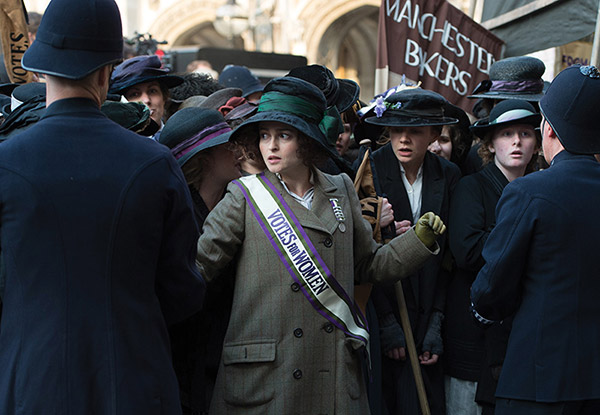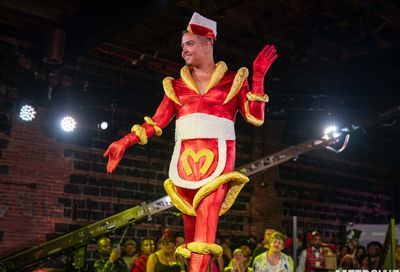Rock the Vote: Suffragette (review)
"Suffragette" is an emotional look at the often violent fight for women's voting rights in Britain

It’s easy to forget that less than a century ago, women in America couldn’t vote in national elections. For a country established on democratic principles, it’s important to remember who those principles originally extended to: white men.
Across the pond, it was similarly restricted. In Britain, voting was exclusively reserved for rich men for almost six hundred years. By the end of the nineteenth century, that had extended to most men, regardless of income. Women, however, were left out in the cold. Despite decades of activism aimed at universal suffrage, women were still treated as the fairer sex, the fragile sex, the less intelligent sex, the unrepresentable sex.
From a modern viewpoint, it’s appalling, and that’s precisely the reasoning behind Suffragette. As a historical piece, it sheds light on a shockingly unjust model of democracy, a brutally efficient policing system, and an apathetic male population who enjoyed far too many legal protections of their grasp upon society and its female inhabitants.
Suffragette (![]()
![]()
![]()
![]() ) takes an unabashed look at the struggle for women’s voting rights in the early 1900s through the eyes of Maud Watts, portrayed with dedication by Carey Mulligan. Maud is resigned to her lot in life: working in a laundry factory, uneducated, abused by the foreman, married and with a child. When she’s randomly caught in the middle of a suffragette demonstration, she begins her exploration of a movement that came to define women’s rights in the modern era.
) takes an unabashed look at the struggle for women’s voting rights in the early 1900s through the eyes of Maud Watts, portrayed with dedication by Carey Mulligan. Maud is resigned to her lot in life: working in a laundry factory, uneducated, abused by the foreman, married and with a child. When she’s randomly caught in the middle of a suffragette demonstration, she begins her exploration of a movement that came to define women’s rights in the modern era.
It’s told in a fashion we’ve seen countless times before. Maud is the vessel by which we experience the activists, the repression, the struggle that those brave women endured for recognition of their cause. Unlike Stonewall, which handed its fictional protagonist an important role in history, Maud doesn’t throw bricks or deliver profound speeches to incite a movement (a surprisingly eloquent, off-the-cuff oration to the Chancellor of the Exchequer notwithstanding). Instead, she joins other women in grassroots activism, experiencing the patronizing comments, imbalanced laws and horrifying police brutality that so many other, real women experienced in that time. She also experiences the classist undertones of the movement and the inherent racism (there are no black women in the film, as there weren’t in the initial movement), but the former isn’t explored and the latter isn’t even referenced.
One thing Suffragette does get right is the violence, deftly handled by director Sarah Gavron. An early scene, in which a peaceful gathering quickly devolves into a fight between suffragettes and the police, shocks in the way officers beat the women. Gavron never revels in the violence — it’s just gratuitous enough to make its impact felt — and it’s echoed in other scenes. Another standout is Maud being force-fed milk during a hunger strike in prison; the brutality of the action causes even Brendan Gleeson’s hardened police investigator Steed to question the morality of his quest to quell the suffragette movement.
Abi Morgan’s script is full of potent lines (“You are nothing,” Steed tells Maud after she pleas for her cause), and they’re wonderfully delivered by the film’s cast. Mulligan is resilient as the newly awoken Maud, but she is often upstaged by her supporting cast. Helena Bonham Carter delivers a dynamic performance as Edith New, her dedication to the cause unwavering even as her health deteriorates. Anne-Marie Duff shines as Violet Cambridge, who recruits Maud and revels in her activism, but also offers another example of the vile way women were treated. Ben Wishaw brings a quiet determination as Maud’s husband Sonny, who clearly loves his wife but places pride above all else when her activism becomes apparent.
Arguably one of the film’s biggest flaws was in recruiting Meryl Streep to star as Emmeline Pankhurst, a leader in the women’s rights movement and a key figure among the Suffragettes. It’s stunt casting, sure, but Streep’s role is predominantly advertised, despite amounting to, at best, three minutes of screen time. She delivers a speech, meets Maud, and then she’s gone. Pankhurst’s role in the movement is almost sidelined by disappointment at how little Streep actually features.
What’s more, while Gavron commands action well, her grasp on the film falters in other scenes. Streep may have been delivering another magnificent performance as Pankhurst during her speech, but we’ll never know as she gets lost in awkward crowd shots, jump cuts and the film’s incessant use of handheld cameras. Yes, it conveys an almost documentary feel to the narrative, but it’s also bloody annoying — the constant movement is distracting more often than it is immersive. Furthermore, if Gavron uses close focus as a metaphor for personal journey, having actors enter the frame only to become visible at the other side, it’s lost in the number of times she relies on the technique.
As a whole, Suffragette is undoubtedly a high quality product. From the ability of its cast to the message it seeks to impart, it’s a polished, impactful experience. From a modern perspective, it’s harrowing that men treated half the populace as though they were property, useful only for sex and homemaking. Unfortunately, as the film itself displays at its end with a scrolling reel of countries that have extended voting rights to women (spoilers: it’s appallingly short), while men may have granted the vote, they certainly didn’t extend full equality. The gender pay gap is real, with women earning 79 cents for every dollar a man does. One fifth of Congress is female, despite 51 percent of the population being women. A woman’s right to choose is under threat now more so than it has been since Roe v. Wade. And let’s face it, too many men today still consider women little more than sex objects. Suffragette is a sobering lesson in man’s past atrocities in subjugating women, but it’s also a reminder that we still have a hell of a long way to go.
Suffragette opens Friday at the Landmark E Street Cinema. For showtimes visit landmarktheatres.com.
Support Metro Weekly’s Journalism
These are challenging times for news organizations. And yet it’s crucial we stay active and provide vital resources and information to both our local readers and the world. So won’t you please take a moment and consider supporting Metro Weekly with a membership? For as little as $5 a month, you can help ensure Metro Weekly magazine and MetroWeekly.com remain free, viable resources as we provide the best, most diverse, culturally-resonant LGBTQ coverage in both the D.C. region and around the world. Memberships come with exclusive perks and discounts, your own personal digital delivery of each week’s magazine (and an archive), access to our Member's Lounge when it launches this fall, and exclusive members-only items like Metro Weekly Membership Mugs and Tote Bags! Check out all our membership levels here and please join us today!


























You must be logged in to post a comment.